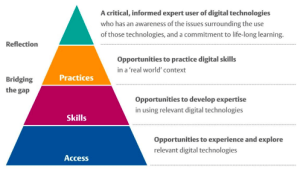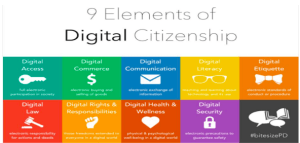We are Part of an Everchanging World
The digital world offers tremendous benefits to us all. It provides platforms that allow us to connect and collaborate. It opens up opportunities to learn new and important issues, and it empowers innovation in ways that were unimaginable just a few years ago.
What is Digital Literacy?
Developing technical skills is crucial. Using technology is an essential life school for life, school, and future employment. Digital Literacy requires critical thinking skills, an awareness of the necessary standards of expected online behaviour, and an understanding of the shared social issues created by digital technologies.
Or alternatively: digital literacy = digital tool knowledge + critical thinking + social engagement.
Digital literacy is the ability to navigate various digital platforms and to understand, assess, and communicate through them. It’s the measure used to determine a user’s ability to properly access and consume content from digital sources such as the internet, smartphones and mobile apps, and more.
Why is Digital Literacy important in education?
Digital literacy creates new ways to teach and learn within the classroom. Students are discovering how to interact with their interests online and through digital media. They are no longer confined to just physical text when it comes to reading or learning about their possible interests. Opportunities are created which involves the use of networking tools for the purpose of developing a community and connection.
Demonstrating skills is essential for safety and security in the digital world; protection of passwords, personal privacy, privacy of others etc. Ultimately, Digital literacy is necessary in education to become digital citizens; individuals responsible for how they use technology to interact with the world around them.
Deep Learning and Digital Literacy
There are six core skills that are essential to digital literacy and learning:
Collaboration. The ability to work collaboratively with others, with strong interpersonal and team-related skills.
Creativity. Being able to weigh up opportunities in an entrepreneurial manner and ask the right questions to generate new ideas.
Critical thinking. Being able to evaluate information and arguments, identify patterns and connections, and construct meaningful knowledge and apply it in the real world.
Citizenship. The ability to consider issues and solve complex problems based on a deep understanding of diverse values and a worldview.
Character. Traits such as grit, tenacity, perseverance, and resilience; alongside a desire to make learning an integral part of living.
Communication. Being able to communicate effectively through a variety of methods and tools to a range of different audiences.
Digital Literacy Conceptual Framework:
Nine Elements of Digital Citizenship:

